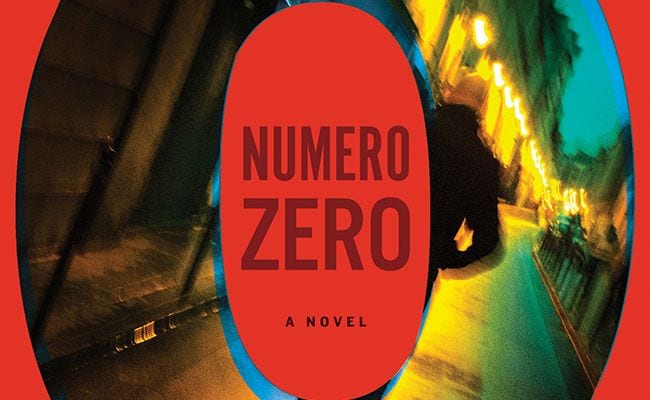
A History of Everything … and Nothing
Beware of stories by hack journalists who are given a chance at doing something greater and in the process discover that the seemingly too-good-to-be-true offer masks something darker that will test the limits of their conflicted ambition and fraying morality. Fortunately, Umberto Eco’s newest crackpot thriller, Numero Zero, is not one of those stories. His hack journalist doesn’t aspire to much more than he is, and he’s in on the big secret from the get-go. Unfortunately, the novel, for all its intellectual zip and brash erudition, never builds into anything more than a trifle.
Colonna is a self-described hack journalist and ghost writer for a mystery novelist who gave himself an American-sounding pen name “to improve sales, like the actors in spaghetti westerns.” As a writer who doesn’t need the thrill of seeing his byline, Colonna is the perfect ghost. “I enjoyed working in the shadows, hidden behind a double veil.” So when he is approached in 1992 by Di Samis, an old professor of his, to work on an intriguing and very well-funded new project, the fact that none of its pages will never see the light of day is no problem.
Unlike many conspiratorial tales, here the first veil is pulled back almost without effort. Di Samis just lays it all out for Colonna.
Commendatore Vimercate, a dicey entrepreneur whose racket is nursing homes and a clutch of sleazy tabloids, is financing a project called Domani. He wants 12 issues of a newspaper that will “tell the truth about everything”, only it will never be published. Vimercarte’s plan is to simply show those issues to certain figures in the world of high finance that he desperately wants admittance to, and the doors will swing wide.
In exchange for not publishing, of course. Colonna’s job is to work on the editorial staff and then write a fanciful account of the whole affair where it’s presented as a tragic tale of an independent newspaper forced to fold by powerful interests. He will be paid 80 million lira for about a year and half of work.
As a goof on the sad state of Italian civic affairs, this is an admirably audacious setup. The amused layers of cynicism and manipulation will be all too familiar to students of that perennially scandal-strafed society. Also, the open-source invitation to the journalists to write not about what did happen but what could happen, leaves the door wide open for the kind of half-informed speculation that typifies the most viral of modern media narratives.
After the initial conspiracy is dissected with engineering exactness, a second is mooted with dire consequences. One of Colonna’s cohorts, trained in the art of conspiracy-mongering by his father, is deep in work on a theory about the truth of what truly happened to Benito Mussolini near Lake Como at the end of World War II. It starts off with some suspicious activities and a tantalizing “what if” counterfactual of the kind that tend to bloom around the last days in Hitler’s bunker. The theory then blossoms into a grand narrative about the grave and malicious influence of shadowy “stay-behind” fascist elements throughout Europe after the war.
It’s classic conspiracy material, claiming to pull back the curtain and to reveal the powerful men pulling the levers. Only Eco doesn’t try to locate the fell voice of hidden truth that so often animates story of this sort. Maybe the story is true, maybe it’s not. Perhaps the most frightening aspect is simply that it could be true.
As fiction, though, Numero Zero suffers from a deadly lack of momentum. Colonna is barely in the door at his new job before the book is hijacked by rounds of story meetings. In these editorial bull sessions, Eco lets fly with a staccato spray of satirical pieces about journalism, media, and the clichés that make them all go ‘round. In response to Braggadocio’s comment that a certain expression was banal, Colonna responds emphatically that of course it’s banal. That’s the language of the form and what the audience has been trained to expect:
Readers understand what’s going on only if you tell them we’re in a no-go situation, the government is forecasting blood and tears, the road is all uphill, the Quirinal Palace is ready for war, Craxi is shooting point blank, time is pressing, should be not be taken for granted, no room for belly-aching, we’re in deep water or, better still, we’re in the eye of the storm. Politicians don’t just say or state emphatically; they roar. And the police act with professionalism.
Eco’s puckish delight at skewering the form in this manner is most of what keeps Numero Zero as readable as it is. As ever, the old master linguist is fascinated by words, and how they are deployed.
There’s a sense here, though, that the author is taking all of this no more seriously than Colonna did his previous job. There are characters named Palatino and Braggadocio and countless detours into sidebars. There are times when the book evinces some of the chipper insouciance of a late-period Thomas Pynchon escapade. But a little of this goes a long way, and soon the asides are just draining whatever little narrative tension has been built along the way. Eventually Eco gets around to really trying to build up a head of steam around his dangerous conspiracy — one figure in which Eco memorably describes as possessing “the logic of an exhibitionist lunatic, but a lunatic who has reliable information” — but it’s too little and too late.
It’s possible that Eco might actually have found more dramatically at stake in the story about journalists publishing a fake newspaper then the story about how all of postwar European history was controlled by ruthless Fascists operating from the shadows. The former could seem more outlandish than the latter.


![Call for Papers: All Things Reconsidered [MUSIC] May-August 2024](https://www.popmatters.com/wp-content/uploads/2024/04/all-things-reconsidered-call-music-may-2024-720x380.jpg)



